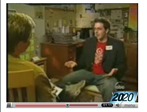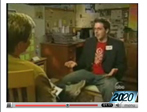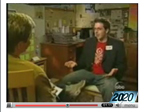 Alright. Something weird is going on here.
Alright. Something weird is going on here.
In the past few weeks, I’ve had three different people make almost the exact same comment to me.
First it happened in Salt Lake City. I was recovering from a multi-speech day, resting in my hotel room, watching Anchorman. I checked the voicemail on my cell. It was from a strange guy named Mike. His message explained that he’d read my first book and would love to chat sometime.
Cool, I thought. And since I’d already seen Anchorman 73 times, I decided to return his call. A few minutes later, I dialed his number from my cell phone ID. He picked up and said hello.
“Hey Mike, it’s Scott, The Nametag Guy!”
“Really?” he asked, followed by a brief silence. “Oh. Hi. Wow, I…uh…really didn’t expect you to actually call me back.”
Hmmm…
And so I said to him (in slight confusion), “Mike, why wouldn’t I call you back?”
“I…I don’t know, I guess. I just didn’t expect it.”
We talked for a few minutes. Pretty cool guy, too. Turns out one of my newest clients was Mike’s former boss at the University of Delaware. Small world, huh?
Anyway, after I hung up, I sat there and wondered: Wait, why wouldn’t Mike expect me to call him back? Isn’t that what you do when you get a voicemail?
We’ll come back to that in a minute. Check out what happened the next day…
I got an email from a potential client who was interested in booking me for an upcoming conference. Excited about the opportunity to work together, I emailed her back two minutes later (like I usually do) with my fee schedule, program description and availability.
Sure enough, later on that afternoon, she wrote back to confirm the engagement! Excellent! I thought.
Then – and I kid you not – the exact words in the body of her email: “Wow, I can’t believe you actually emailed me right back! Are you sure you’re a speaker?”
Yes. She actually said that.
And again, I was thinking, But why wouldn’t she expect to get an email right back from me? Isn’t that what you do when a potential customer inquires about hiring you?
But wait. It gets better.
Last week I was working in Toledo at an entrepreneur conference. The night before my speech, I went out to dinner with my client and a few of her colleagues from the organization.
“Scott, meet Laura,” my client said, “She told me the two of you have already spoken, right?”
“Oh yeah, right. I remember! Nice to meet you in person Laura,” I said.
“You too Scott,” she said. “And by the way, I was really impressed that you actually picked up your cell phone when I called last week. I wasn’t expecting that!”
“Really? But why wouldn’t I pick up the phone?” I asked.
“Oh I don’t know, I…just…didn’t think you would.”
OK. Just stop right there. I gotta figure this out.
I pondered for a minute. Scratching my head like I’d been doing something wrong this whole time.
And then it hit me. Holy crap!
All of these people expect to be ignored because that’s the attitude they have developed after working in the corporate world.
The world of unreplied emails.
The world of unreturned phone calls.
The world of unapproachable professionals.
And I never worked in the corporate world. That’s why this is news to me. How am I supposed to know, right?
Never had a cubicle.
Never had an office.
Never had to fill out TPS reports.
See, I started my company right out of college. No experience. Fresh meat. Untainted by the cruel hands of the white-shirted, red-tied corporate drones a la Dilbert cartoons.
I guess I just don’t know any better.
And I say that in a good way.
See, I return calls and emails right away because, well, that just seems like the right way to do business.
Like the right way to treat people.
Like the same way I would treat my friends.
Like the same way I would want to be treated.
Now, maybe I’m naïve. Sure, I’m 26 years old. I don’t know much.
But I DO know that the one compliment I seem to get more than anything is, “Gosh Scott, you’re so easy to get a hold of!”
And the sad thing is: that should NOT have to be a compliment.
That should be standard operating procedure for all professionals, regardless of age, industry, annual income or job title.
Something weird is going on here. And I don’t think it’s just me.
Ain’t no hollaback girl? Not for this guy.
LET ME ASK YA THIS…
Have you ever “surprised” someone by being easily accessible?
LET ME SUGGEST THIS…
For one week, try returning calls and emails within five minutes of receiving them (if you don’t already). See what happens. I Triple Dog Dare you.
* * * *
Scott Ginsberg
Author/Speaker/That Guy with the Nametag
www.hellomynameisscott.com
add to del.icio.us * digg it! * email this post

 Are you the luckiest person you know?
Are you the luckiest person you know?
 Not the yen.
Not the yen. Are you the luckiest person you know?
Are you the luckiest person you know? “Hey Scott, how do you get 35,000 hits a day on your website?” I’m often asked.
“Hey Scott, how do you get 35,000 hits a day on your website?” I’m often asked. Are you the luckiest person you know?
Are you the luckiest person you know? The other day I overheard a lady talking about her company website.
The other day I overheard a lady talking about her company website. Nope, it isn’t “marketing.”
Nope, it isn’t “marketing.” WARNING: This article does not encourage readers to actually punch their customers in the face.
WARNING: This article does not encourage readers to actually punch their customers in the face.  Potential customers, fans, friends, family members, audience members, readers of your material, website visitors, and pretty much anyone else that comes into contact with your business needs to know three things.
Potential customers, fans, friends, family members, audience members, readers of your material, website visitors, and pretty much anyone else that comes into contact with your business needs to know three things.  Alright. Something weird is going on here.
Alright. Something weird is going on here. 